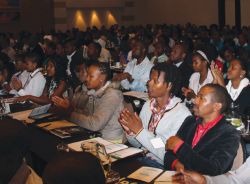Draft youth policy2015-05-27 The National Youth Policy is informed by the UN World Programme of Action for the Youth to the Year 2000 and beyond, and the African Youth Charter. Challenges faced by youth in Africa include: education, skills, competence development, employment and sustainable livelihoods, youth leadership and participation, health and welfare, peace and security, environment protection and cultural and moral values. The current draft improves upon and updates the previous youth policy by speaking to new and continuing challenges faced by South Africa's youth.
POLICY PROPOSALS Economic Participation The draft youth policy highlights that youth empowerment should be one of the core outcomes of the economic and social transformation agenda. Business and labour should be required to make firm commitments to creating jobs for young people. The effectiveness of the Employment Tax in stimulating job creation for new entrants in the labour market will be examined. There is a need for a conversation around what competencies/skills should be acquired by learners in order to prepare for the world of work. Redress and BEE for Young People The draft youth policy calls for the creation of an enabling environment for SMMEs and entrepreneurs to thrive. This includes: • Inculcating the spirit of entrepreneurship in schools • Lowering the cost of doing business in the economy • Reducing barriers to entry in various value chains • Aligning all legislation and / the codes and charters that flow from the BBBEE Act of 2003 • State procurement used more effectively to advance socioeconomic transformation Rural Development and Land Reform for young people The Department of Agriculture and the Department of Rural Development could focus on improving small scale and commercial agriculture access. Education, Skills and Second Chances The Technical and Vocational Education and Training (TVET) sector should cover about 25 % of the age-relevant cohort. Attention needs be given to provide unskilled and uneducated youth with second chance opportunities. Community colleges have been designed to cater for youth who neither completed their schooling nor attended school and as a result do not qualify to study at TVET colleges and universities. South Africa needs a skilled labour force to thrust the country onto a higher developmental trajectory. The skills needed to achieve this include engineering, sufficient doctors, nurses and health professionals in different occupational classes to deliver quality healthcare, as well as researchers and innovators. Health Care and Combating Substance Abuse Adolescents should adopt a core value system that propagates good self-image and thus nurturing the skills and capacities needed to be assertive in negotiating and making decisions about their SRHR (Sexual and Reproductive Health and Rights). Nation Building and Social Cohesion The social, psychological, and geographic elements of apartheid continue to be part of the lives of many South Africans. The draft policy calls for the fostering of leadership across society, active citizenry, as well as fostering the values outlined in the Constitution. Optimising the youth machinery for effective delivery and responsiveness. While the NYDA remains a major catalyst for youth development: • Government as a whole (nationally, provincially and at the local level) must spearhead youth development across all departments. • Business must place youth development programmes at the centre of their development and expansion strategies. • Youth development machinery must be consistent with the location of youth development programmes at the centre of transformation and the vision of the National Development Plan; that of bringing about a prosperous and more equitable society by 2030. stephanie@superfecta.info www.superfecta.co.za |
Draft youth policy
Copyright © 2026 KwaZulu-Natal Top Business
